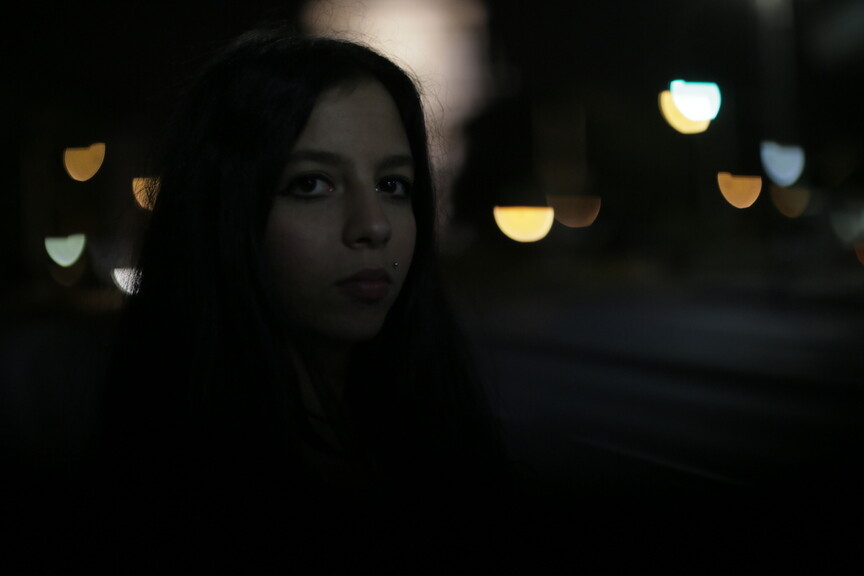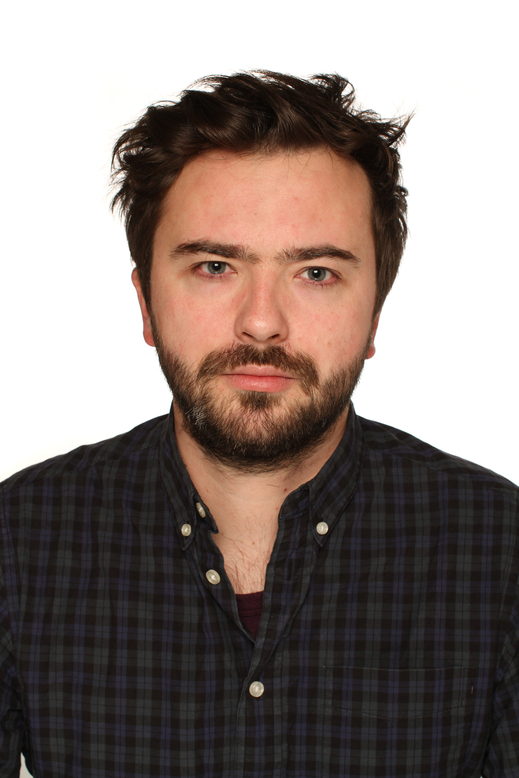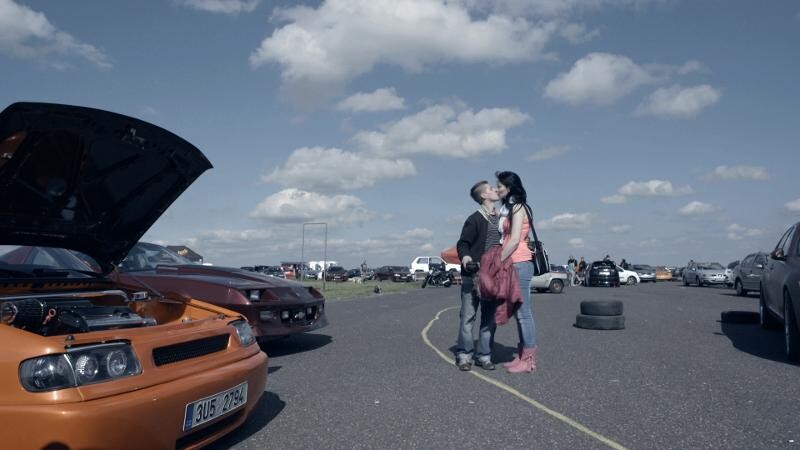A Film Must Go to the Edge to Have Its Own Style
The protagonists of The Great Night are male and female prostitutes, alcoholics, drug addicts, gamblers, people on the edge of the society. These people are often presented as victims; victims of their traumas, their addictions, as well as of the system. The majority society; the world of the day; is responsible for their situation in a way. You have completely avoided this dimension though. Why?
I don’t think my characters are primarily victims of the society. Their lives are more complex; one cannot say they’re just passive, without a will of their own, kicked around by the system. They have often decided for their way of life. With a few exceptions, they do not participate in the common society, they are not in touch with it. The common society of people who go to work and live family lives is not part of their reality; perhaps just as something they are trying to make use of for their own benefit. Most of the characters simply belong to a certain subculture which is similar in any regime.
Doesn’t such emphasis on the autonomy of the protagonists deprive the audiences of their responsibility? To a certain degree, your protagonists are “stock characters” whose stories are nice to look at. They are not lacerating. However, you have also made a different kind of films; you are interested in an engaged approach, considering film as a means to change people’s perception of reality and its interpretation. Don’t you think that you have compromised yourself a little in this film?
Each theme requires a special approach. I have originally conceived my film in a much broader way, however, as I got closer to my characters in the course of shooting, I stopped finding the social and political context interesting. To me, The Great Night is rather an existential film. However, it’s obvious that the common society is only here for people who live within certain acceptable limits. If you’re too sensitive or a little bit unhinged, you cannot successfully function in it. You can only live within a certain subculture which will give you an alternative living space. There are people who incline to the night due to their own disposition.
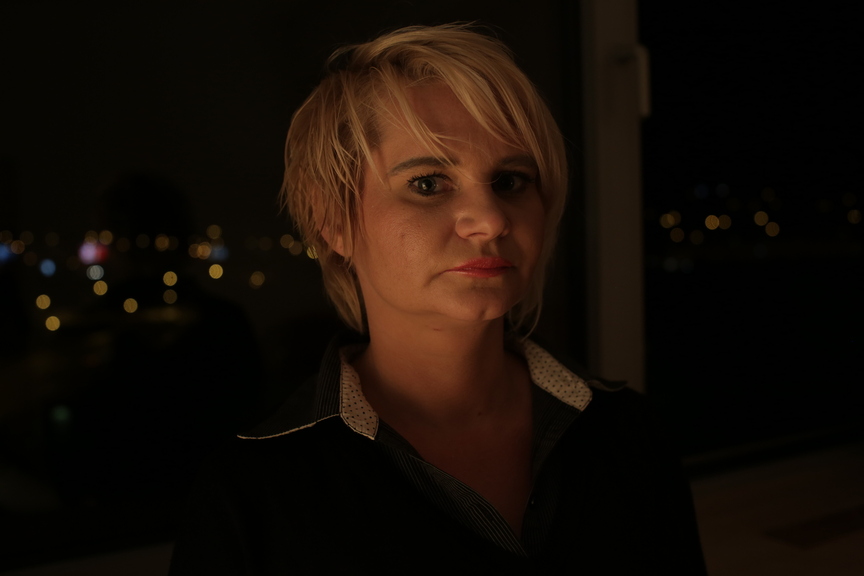 |
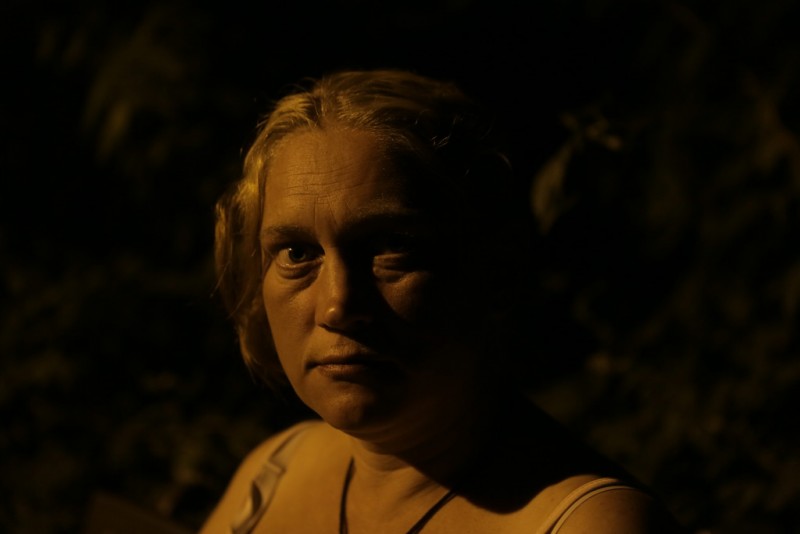 |
The Great Night
More Night
What about the shooting process? Could you describe it step by step? Let’s start with how you came upon the very subject...
In my third year at FAMU, I have made a film called Advent featuring several characters who also appear in The Great Night. I have shot it on 35mm film and I had little time and money. After the shooting, I was sorry that the film was so short and wanted to get back to the theme. I have therefore written a subject which was called The Great Night from the very beginning. I have addressed some of the protagonists of Advent who then got me some more characters. The original idea was to make a film that would only take place at night. However, I was originally interested in city nightlife rather than in particular characters.
At what stage did you start focusing on selected characters?
We had one year for shooting and approximately thirty shooting days. Thanks to the generosity of HBO, we were not forced to use everything we filmed. First I have approached the theme quite broadly, however, I was gradually getting rid of the ballast and tried to focus on the main characters. In the end it became clear that symbolically, they have more night in them than the night as a concrete setting itself.
How did this gradual focusing work in particular?
At the beginning, we have agreed not to edit all of the material at once. We would always shoot for three or four nights and then we would go to the editing room, searching for moments we liked and saw as principal. It is easier to see the dramatic line, or things that are missing, in the editing room. After each editing, I knew that I had to call this or that character to add something to the film. I consider this way of working as ideal.
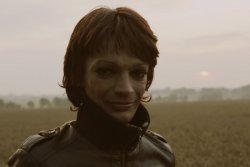 |
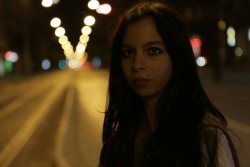 |
The Great Night
Reenactments in The Great Night
So if you found that “something was missing”, how would the shooting continue? What instructions would you give to your characters?
As simple ones as possible. For instance, I said to the prostitutes at Karlovo náměstí that I wanted to show how they spend a regular night, and asked them in a banal way to talk to each other as if we weren’t there. They would mostly start talking about what they would like to eat.
But they do not speak about food in the film.
I had to correct them slightly. I asked them to speak about what they did, what kind of client they had, about drugs... So I would give them a theme and then I would see to it that they do not overact and that they speak clearly.
And what if they did something wrong; would you ask them to repeat their line?
In some cases, I would do it, however, it depended on the situation. Some of them were better the first time, while others had to be reassured that they were doing great on camera, and only then would they make it. It depends on the person, on the drug he or she has taken, and on their current mood. In many cases, I would use a reconstruction of a story or conversation the characters would hold before.
It’s interesting that your characters do not have a problem with repeating their lines. The lines of non-actors usually lose their natural character when repeated. Didn’t they resist having to repeat or reconstruct something?
On the contrary. They loved it. What was important, however, was the fact that we knew each other for ages, we have spent a lot of time together before I even started considering making The Great Night. This method cannot be recommended in general; I can’t see working like this with another kind of people or another theme. My characters are extroverted and like to overact, show off and boast about themselves. They also love to suffer. It was an advantage that they’re like that in their personal lives as well. They’re professional actors in their own environment.
Did you have a pre-arranged plan of themes to be discussed by your characters?
I did write a script before shooting, mainly because of the producers who require it, however, I wouldn’t stick to it much. What is surprising though is that after the film was finished, the resulting form was very similar to the script.
Is there any space left for surprising moments with such an approach? Or would things mostly work out “according to the script”?
We could not anticipate everything. For instance, during one of the first shooting days, I wanted to film Helena in her flat. The shooting took place at 4 am and Helena was really drunk. I could not go in as I would be seen in the film, so I ordered her to go in, show us the flat and say nothing. Helena would always forget the instructions on her way up the stairs and started saying that she didn’t know what to do. We had to shoot the scene four or five times. During the last attempt, she has spontaneously summed up her life story on camera, without being asked to do so. First I was angry at her, as I wanted her to remain silent, but in the editing room I have realized that though she was drunk, overacting and boasting of her tragedy, all of what she said was completely true.
The Great Night received a number of awards; the Best Czech Documentary Award at Jihlava International Documentary Film Festival 2013 and the Golden Kingfisher Award at Finále Plzeň 2014. How do you perceive these awards?
Of course it is gratifying and pleasing to be praised by someone. However, I do not attach any other value to the awards, as they don’t have any. It’s just a game of the film industry; a part of the system reigning in the field of cinema. Each filmmaker should have a certain self-confidence and self-assurance regardless of the ruling aesthetic norms, which are predominantly temporal and local.
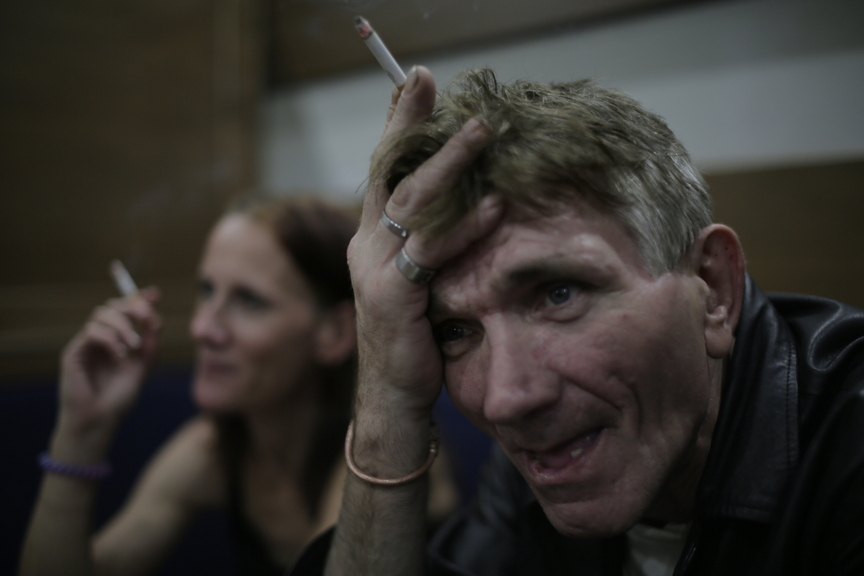 |
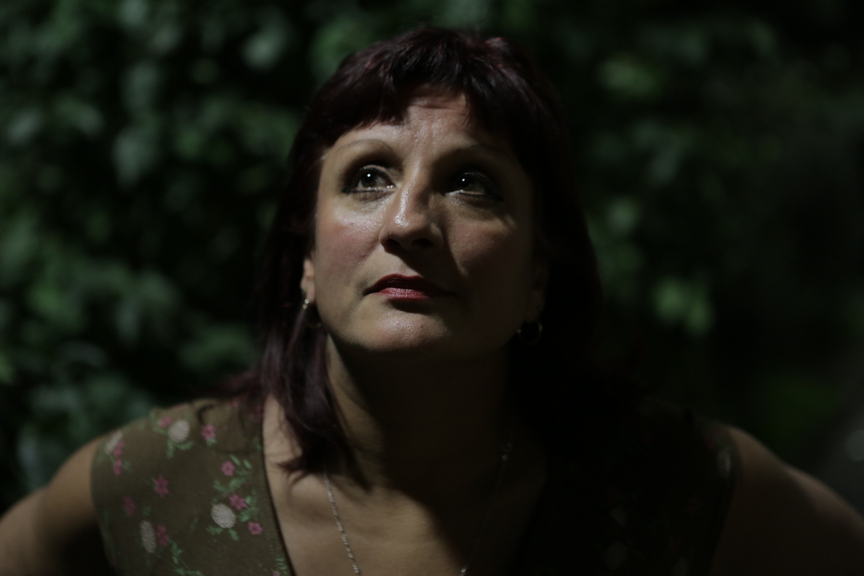 |
The Great Night
Deconstruction of Vávra
What about your other projects? You have made Prolegomena to Virtual Framing of a Revolution, in which you have tried to reflect the Arab Spring in the online environment. The film was to be followed by a project called Digital Prints of a Revolution where you wanted to compare the digital and real image of the revolution. What happened to the project?
The project was too expensive and nobody was willing to produce it. I have only been to Egypt for location scouting, for about a week, during the first anniversary of the revolution. We were trying to find an Egyptian production, however, everybody was there then, big stations such as the BBC and Al Jazeera, who paid a lot of money to the production companies. We also did some shooting. There were some 800 000 people at Tahrir Square, ranging from ultraconservative Muslims through Bedouins to Christians, women wearing skirts as well as completely veiled ones. All of them were celebrating, helping each other in the hustle, nobody died, there was no shooting. It was one of the strongest moments in my life; among the million celebrating people, I had a strong feeling that we really were one big body, that the individual would dissolve and utopia would become reality. It was the last moment of Egypt’s unity; then everything got fucked up again. Nevertheless, we might get back to the film; Kamila Zlatušková of Brno CT has read the subject recently and was interested in it.
Recently you have filmed a part of the upcoming film adaptation of Szczygieł’s Gottland. Which of the short stories have you chosen?
I have chosen the one dealing with Lída Baarová. I am fascinated by ruined lives; at the same time, I like feature film and classic genre cinema. Moreover, the story of Baarová links politics, Nazism, alcoholism, sex and death; that’s a really powerful theme for me. The only problem was how to approach it, as I didn’t want to make another television portrait of a famous person.
What were the options? What decisions did you have to make?
Originally I wanted to make a compilation film out of archive footage with a voiceover, however, the copyright was too expensive. Then I discovered the rough material for a film about Lída Baarová made by Otakar Vávra in 1995 for the Gen documentary series stored in the archive of the Czech Television. Vávra’s film is 15 minutes long, sentimental and stupid. However, the material I have discovered is 2 hours long and is much more interesting. It captures the struggle between Vávra and Baarová. She was in a terrible state then, often drunk. He would constantly try to make her speak about Goebbels, which she refused. She would run away, quit the scene, or confide her suffering to Vávra, who would only say “well, yeah, let’s shoot”. He has mistaken making a documentary about Bárová for making a feature film with Baarová. Every time Lída Baarová would say saying something interesting, he would say: “Stop!” So I have edited my own version of Gen. However, when Fero Fenič, founding father of Gen, and Jitka Němcová, Vávra’s widow, the copyright owners, found out, they didn’t allow us to use the material. They believed that we were trying to abuse a national great. In the end, I have made a reconstruction of the encounter of Baarová and Vávra, reenacting the authentic dialogues and actions. I hope that the result is both witty and scary, bearing witness to cinematography, old age, ruined lives, fear...
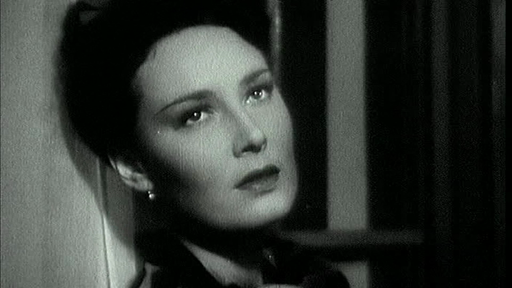 |
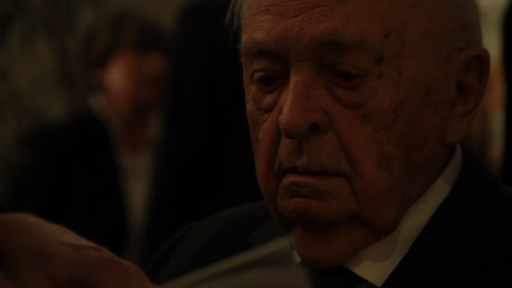 |
Gottland (P. Hátle, 2014)
So your film is completely comprised of reenacted scenes from Vávra’s shooting of Gen with Lída Baarová?
I have written a script based on Vávra’s original material, according to which we have staged the main scenes with the actors. I have also used a few minutes of the material they have allowed me to use. So the film combines original footage and staged scenes. We have also filmed at the celebration of Otakar Vávra’s 100th birthday, which was one of the most bizarre experiences in my life.
In what sense?
Picture Otakar Vávra, or rather the body of Otakar Vávra, in the Mánes Exhibition Hall crowded with journalists and B-movie stars, with president Václav Klaus standing out. Vávra could not see or hear, they had to make him stand and turn him around. Perhaps it was so scary because I am scared of old age myself.
However, it is death, the last days of Baarová and Vávra, you are depicting in your film...
When you make mistakes in your life, you cannot end up well. I guess you can never end up well. Perhaps it’s because you can’t avoid making mistakes.
|
Author's archive |
Petr HátlePetr Hátle (1983), student of the last year of the Department of Documentary Film at the Film and TV School of the Academy of Performing Arts (FAMU). His short student film Advent, which won the award of Cinepur magazine in 2010, depicts a sequence of vivid images from Prague’s nightlife before Christmas. The film became a basis for The Great Night, capturing the environment of several persons participating in Prague’s nightlife. The film won at Jihlava International Documentary Film Festival in 2013, at Finále Plzeň in 2014 and has been screened at numerous international festivals. Hátle has recently finished a film adaptation of one of the stories from Mariusz Szczygieł’s Gottland. |
Translated into English by Tereza Chocholová

